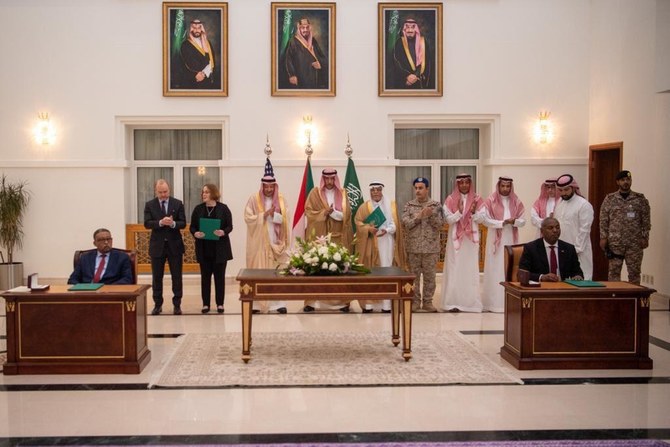*Sudanese Armed Forces and Rapid Support Forces signed declaration in Jeddah on Thursday
*Talks between the two sides are being brokered by Saudi Arabia and the US
*Plus FULL TEXT OF DECLARATION
The Sudanese Armed Forces (SAF) and its rival Rapid Support Forces (RSF) signed on Thursday a declaration committing themselves to International Humanitarian Law to facilitate humanitarian action to meet the needs of civilians.
In a document titled “Jeddah Declaration of Commitment to Protect the Civilians of Sudan”, carried by Saudi state media, the warring parties also promised to prioritize discussions “to achieve a short-term ceasefire to facilitate the delivery of emergency humanitarian assistance and restoration of essential services.”
Representatives of the warring generals — SAF chief Abdel Fattah Al-Burhan and RSF paramilitary commander Mohamed Hamdan Daglo — have been meeting since Saturday in Jeddah for “pre-negotiation talks” facilitated by Saudi Arabia, with participation of the United States and the United Nations.
“We agree that the interests and well-being of the Sudanese people are our top priority and affirm our commitment to ensure that civilians are protected at all times. This includes allowing safe passage for civilians to leave areas of active hostilities on a voluntary basis, in the direction they choose,” the declaration said.
The two sides also affirmed their responsibility and obligation to “distinguish at all times between civilians and combatants and between civilian objects and military targets.”
A joint Saudi-US statement said “the declaration will guide the conduct of the two forces to enable the safe delivery of humanitarian assistance, the restoration of essential services, the withdrawal of forces from hospitals and clinics, and the respectful burial of the dead.”
“Following the signing, the Jeddah Talks will focus on reaching agreement on an effective ceasefire of up to approximately ten days to facilitate these activities. The security measures will include a US-Saudi and international-supported ceasefire monitoring mechanism,” the statement said.
Saudi Foreign Affairs Minister Prince Faisal bin Farhan on Friday said the talks that took place and the declaration of commitment to protect civilians is just a first step.
“Other steps will follow, and the most important thing is to adhere to what was agreed upon. The Kingdom will work until security and stability return to Sudan and its people,” Prince Farhan said in a tweet .
More than 750 people had been reported killed and thousands wounded and displaced since fighting broke out in the North African country on April 15.
The signing of the document is crucial because at least 18 humanitarian workers have been killed in the fighting.
Many UN agencies and NGOs announced temporary suspensions of their work in Khartoum and Darfur in the face of violence. They have partially resumed their work, but remain wary of threats.
The UN’s World Food Programme said millions of dollars worth of food had been looted in Khartoum, Sudan’s capital city.
The agreement commits both sides in general terms to let in badly needed humanitarian assistance after looting and attacks targeting aid in the impoverished country, Africa’s third largest in area.
The declaration calls for the restoration of electricity, water and other basic services, the withdrawal of security forces from hospitals and “respectful burial” of the dead.
A US official involved in the talks, speaking on condition of anonymity, said a proposal on the table would establish a new 10-day truce, which would lead, in turn, to negotiations on a longer-term end to fighting.
“This is not a cease-fire. This is an affirmation of their obligations under international humanitarian law, particularly with regard to the treatment of civilians and the need to create space for humanitarians to operate,” the official said.
“We are hopeful, cautiously, that their willingness to sign this document will create some momentum that will force them to create the space” to bring in relief supplies, she said.
The two sides also agreed for the first time on a way to monitor any cease-fire, officials said.
A second US official said the negotiations were “very tough” and acknowledged that both sides may have ulterior motives through the cease-fire monitoring.
“Candidly, there is some hope on both sides that the other side would be seen as being the perpetrator of violations,” he said.
But, he added that the length of time spent in brokering the first step would at least make the cease-fire more “effective” if reached.
Diplomats and experts have questioned whether the two sides want peace or if they are more interested in vanquishing the other.
The conflict erupted when the paramilitary forces, established and groomed by former dictator Omar Al-Bashir, refused to be integrated into the army in line with a pathway for a transition to civilian rule.
The US brokered a temporary truce and threatened sanctions on the warring parties last week after it expired.
Some US lawmakers have voiced alarm that the focus on the two generals essentially sidelines the pro-democracy forces.
“We cannot allow the civilian leadership of the groups that led the brave uprising that overthrew Omar Al-Bashir to be shoved aside,” Senator Chris Coons, a Democrat close to President Joe Biden, told a hearing Wednesday.
Also Thursday, the United Nations’ top rights body narrowly decided to beef up monitoring of abuses in Sudan, expanding the work of an existing special rapporteur.
But the vote was close. The move was led by Western countries, with 18 members of the Human Rights Council in favor, 15 opposed and 14 abstaining.
(With AN/AFP)
* * *
FULL TEXT OF THE DECLARATION
Jeddah Declaration of Commitment to Protect the Civilians of Sudan
Preamble
Recognizing the necessity of uplifting the plight and misery from our people resulting from the ongoing fighting since April 15, 2023, in particular in the capital of Khartoum, responding to urgent humanitarian needs of our civilian citizens, Responding to the various initiatives of the brotherly and friendly countries, led by the Saudi-American initiative, We, the undersigned, representing the Sudanese Armed Forces (SAF) and the Rapid Support Forces (RSF), with this Declaration of Commitment, reaffirm our core obligations under International Humanitarian Law to facilitate humanitarian action to meet the needs of civilians.
We affirm our unwavering commitment to the sovereignty of Sudan and to maintaining its unity and territorial integrity.
We recognize that commitment to the Declaration of Commitment will not affect any legal, security, or political status of the parties signing it, nor will it be linked to participation in any political process.
We welcome the efforts exerted by Sudan’s friends who can use their relationships and good offices to ensure respect for International Humanitarian Law and for international human rights law, including by committing to this Declaration and immediately implementing it.
None of the points listed below displace any obligations or principles under International Humanitarian Law and/or international human rights law that apply in this armed conflict, in particular the Protocol Additional (II) of 1977 to the Geneva Conventions of 1949, and that all parties must meet.
Commitments
1) We agree that the interests and well-being of the Sudanese people are our top priority and affirm our commitment to ensure that civilians are protected at all times. This includes allowing safe passage for civilians to leave areas of active hostilities on a voluntary basis, in the direction they choose.
2) We affirm our responsibility to respect International Humanitarian Law and international human rights law, including obligations to:
a. Distinguish at all times between civilians and combatants and between civilian objects and military targets.
b. Refrain from any attack that may be expected to cause incidental civilian harm that would be excessive in relation to the concrete and direct military advantage anticipated.
c. Take all feasible precautions to avoid and minimize civilian harm, with an aim to vacate urban centers, including civilian houses. Civilians should not be used as human shields, for example.
d. Ensure that checkpoints are not used to infringe upon the principle of the freedom of movement for civilians and humanitarian actors.
e. Allow all civilians to voluntarily and safely leave areas of hostilities and any besieged areas.
f. Commit to safeguard the needs and necessities indispensable to the survival of the civilian population, which can include foodstuffs, agricultural areas, crops and livestock. Looting, ransacking, and ravaging are prohibited.
g. Commit to vacate and refrain from occupying, as well as to respect and protect all public and private facilities, such as hospitals and water and electricity installations, and refrain from using them for military purposes.
h. Commit to respect and protect medical transports such as ambulances and refrain from using them for military purposes.
i. Commit to respect and protect medical personnel and public installations.
j. Uphold and not hamper the right of civilians to pass and travel via roads and bridges, inside and outside the State of Khartoum.
k. Take all possible measures to collect and evacuate the wounded and sick, including combatants, without discrimination, and allow humanitarian organizations to do so; do not impede medical evacuations, including during active hostilities.
l. Refrain from the recruitment of children and the use of children in hostilities.
m. Refrain from engaging in forced disappearances and arbitrary detention of civilians.
n. Refrain from any form of torture or other cruel, inhumane or degrading treatment, including sexual violence of all kinds.
o. Treat all persons deprived of their liberty in a humane manner and provide principal humanitarian organizations with regular access to persons in detention.
3) We recognize that humanitarian activities solely aim to alleviate human suffering and protect the lives and dignity of persons who are not or no longer fighting. We agree on the need to allow principal humanitarian operations to resume and to protect humanitarian personnel and assets, including to:
a. Respect the fundamental humanitarian principles of humanity, impartiality, neutrality, and operational independence.
b. Allow and facilitate the rapid and unimpeded passage of humanitarian relief, including medical and surgical equipment, and ensure relief personnel the freedom of movement required for their functions. This includes:
i. Facilitating the safe, rapid and unimpeded passage of humanitarian personnel through all available routes (and any established humanitarian corridors) as required by the needs, into and within the country, including the movement of humanitarian convoys.
ii. Adopting simple and expedited procedures for all logistical and administrative arrangements necessary for humanitarian relief operations.
iii. Observing the implementation of regular humanitarian pauses and days of tranquility as needed.
iv. Refraining from interference with principal humanitarian operations and never accompany side by side humanitarian personnel carrying out humanitarian activities, in conformity with the Amended Directives and Procedures for Humanitarian Action in Sudan.
c. Protect and respect humanitarian workers, assets, supplies, offices, warehouses, and other facilities. Armed actors must not interfere in the actions of humanitarian operations. While respecting the principle of the neutrality of humanitarian actors, armed actors must guarantee the security of corridors for transport and areas for storage and distribution. It is prohibited to attack, harass, intimidate, or arbitrarily detain personnel, or to attack, destroy, misappropriate or loot relief supplies, installations, material, units or vehicles.
4) We commit to exert all efforts to ensure that these commitments—and all obligations of International Humanitarian Law—are fully disseminated within our ranks and appoint focal points to engage with humanitarian actors to facilitate their activities.
5) We will enable responsible humanitarian actors, such as the Sudanese Red Crescent and/or the International Committee of the Red Cross to collect, register, and bury the deceased in coordination with competent authorities.
6) We will take all necessary measures to ensure that all persons acting on our instructions, direction or control abide by International Humanitarian Law, and in particular the commitments provided for in this Declaration of Commitment.
7) In furtherance of the principles and commitments contained herein, we commit to prioritizing discussions to achieve a short-term ceasefire to facilitate the delivery of emergency humanitarian assistance and restoration of essential services, and we commit to scheduling subsequent expanded discussions to achieve a permanent cessation of hostilities.
Signed in Jeddah on 11 May 2023 with the facilitation of the Kingdom of Saudi Arabia and the United States of America.
(SPA)




